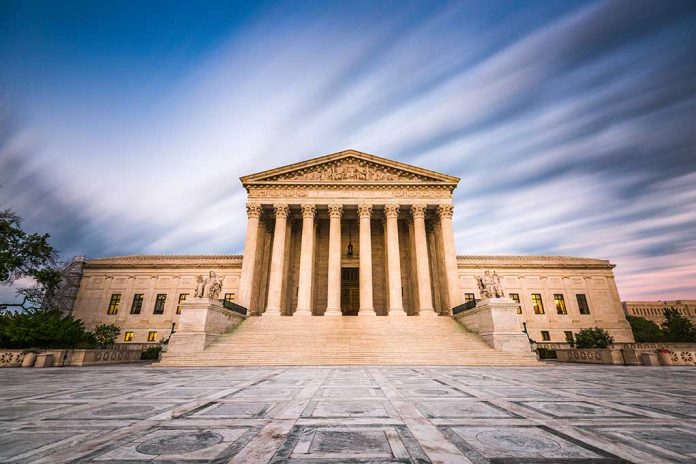
The Supreme Court declined to hear a challenge to Hawaii’s gun-licensing law, leaving the state’s stringent regulation of handgun licenses intact and sparking debate over Second Amendment rights.
At a Glance
- Supreme Court rejects appeal challenging Hawaii’s gun licensing law.
- Justices Thomas and Alito express interest in revisiting the issue.
- Case involves Christopher L. Wilson, charged with carrying a gun without a license.
- Hawaii’s highest court reinstated the case after initial dismissal.
- Conservative states increasingly dropping gun license requirements.
Supreme Court Declines to Hear Hawaii Gun Law Challenge
The U.S. Supreme Court has refused to review a challenge to Hawaii’s gun licensing law, effectively upholding the state’s strict regulations on handgun licenses. This decision comes amid an ongoing national debate about the balance between Second Amendment rights and states’ authority to implement safety measures regarding firearms.
The case in question involves Christopher L. Wilson, who was charged in 2017 for carrying a handgun without a license while hiking on private property. Wilson claims his Second Amendment rights were violated when he was charged with carrying a gun without a license. The Supreme Court’s decision not to hear the case allows Wilson’s trial to proceed in Hawaii.
The Supreme Court has rejected a challenge to Hawaii’s gun-licensing law, though three justices expressed a willingness to hear arguments over the issue later. To see the full story, visit our website at https://t.co/bM8MOmwBi9 https://t.co/W5kWv23Bil
— 2 News Nevada (@KTVN) December 9, 2024
Conservative Justices Express Concerns
While the court as a whole declined to hear the case, some conservative justices expressed interest in revisiting the issue to affirm Second Amendment rights. Justices Clarence Thomas and Samuel Alito, in particular, voiced their concerns about the decision.
Justice Neil Gorsuch suggested that the court might revisit Wilson’s case in the future, stating that it “raises serious questions.” Gorsuch also noted that Wilson remains free to seek the Court’s review after a final judgment is reached in his case.
Hawaii’s Gun Law and Recent Changes
Hawaii’s gun licensing system has been a point of contention, with critics arguing that it infringes on Second Amendment rights. However, prosecutors maintained that the case was under state jurisdiction and cited Justice Brett Kavanaugh’s concurrence supporting state licensing requirements.
In response to ongoing legal challenges and a 2022 Supreme Court decision expanding gun rights, Hawaii has since revised its gun licensing system. The state removed an approval requirement for firearm licenses, potentially easing some restrictions while maintaining oversight.
Implications for Second Amendment Rights
The Supreme Court’s decision not to hear Wilson’s case has broader implications for gun rights across the nation. It allows Hawaii’s regulatory system to stand, reinforcing the state’s emphasis on safety and regulated use of firearms. However, it also highlights the ongoing tension between individual rights and public safety concerns.
As conservative states increasingly drop gun license requirements, the contrast with stricter regulations in states like Hawaii becomes more pronounced. This divergence in state policies underscores the complex and often contentious nature of gun rights in America.
The Supreme Court’s decision, while not directly addressing the merits of Hawaii’s law, effectively allows the state to continue enforcing its stringent gun regulations. As the debate over Second Amendment rights continues, it’s likely that similar cases will emerge, potentially leading to further clarification of the balance between individual rights and state regulations in the future.
Sources:
-
Supreme Court rejects appeal challenging Hawaii gun licensing requirements under Second Amendment
-
SCOTUS Declines Hearing Appeal Challenging Hawaii Gun Licensing Law
-
Supreme Court rejects appeal challenging Hawaii gun licensing requirements under Second Amendment







